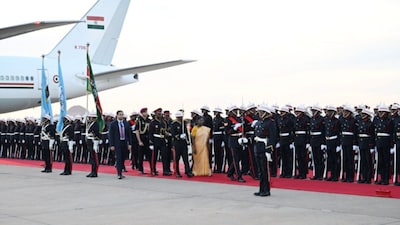Key Takeaways
- President Murmu’s visit is the first-ever state visit by an Indian head of state to Botswana.
- Eight Kalahari desert cheetahs will be translocated to India as part of Project Cheetah.
- The visit includes delegation-level talks and the signing of several MOUs to strengthen bilateral ties.
President Droupadi Murmu received a grand ceremonial welcome in Botswana on Tuesday, marking a historic first state visit by an Indian head of state to the African nation. The visit focuses on strengthening bilateral cooperation, highlighted by a major wildlife conservation initiative involving eight Kalahari desert cheetahs.
Historic Welcome and Bilateral Engagement
Upon arrival at Sir Seretse Khama International Airport in Gaborone, President Murmu was warmly received by Botswana’s President Duma Gideon Boko. The welcoming ceremony included a 21-gun salute, guard of honour, and traditional dance performances.
Rashtrapati Bhavan described the reception as “a special gesture reflecting the depth of India-Botswana friendship” in an official social media post.
Cheetah Translocation and Project Cheetah
A significant outcome of this visit will be the symbolic handover of eight captured cheetahs from Botswana’s Kalahari desert region. The big cats will be released into a quarantine facility at Mokolodi Nature Reserve before their translocation to India.
This initiative falls under Project Cheetah, representing a mutual commitment to wildlife conservation between the two nations.
Diplomatic Agenda and Community Engagement
During her stay, President Murmu will hold delegation-level talks with President Boko, with officials from both sides exchanging Memoranda of Understanding to enhance bilateral cooperation.
She is scheduled to address Botswana’s Parliamentarians on Wednesday and is expected to meet with the Indian community in Botswana before departing for Delhi on Thursday.
The visit follows Murmu’s engagements in Angola, where she highlighted “unlimited” possibilities for strengthening relations in sectors including energy security, diamond processing, and critical minerals exploration.





